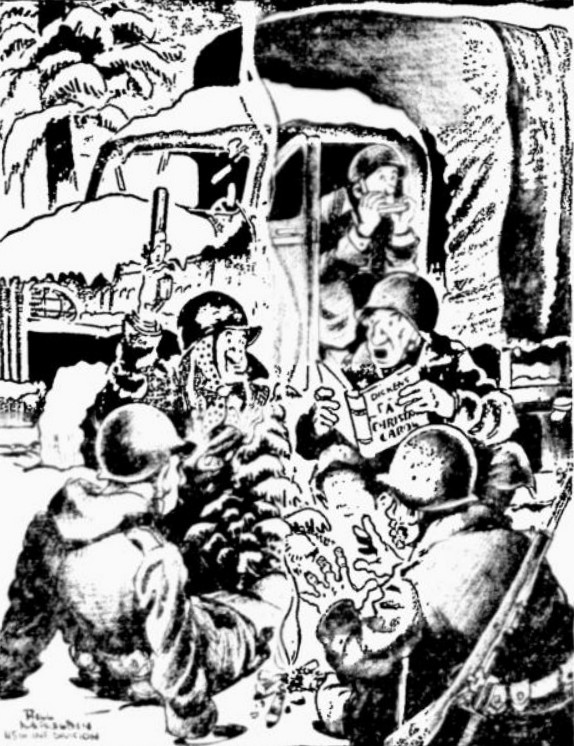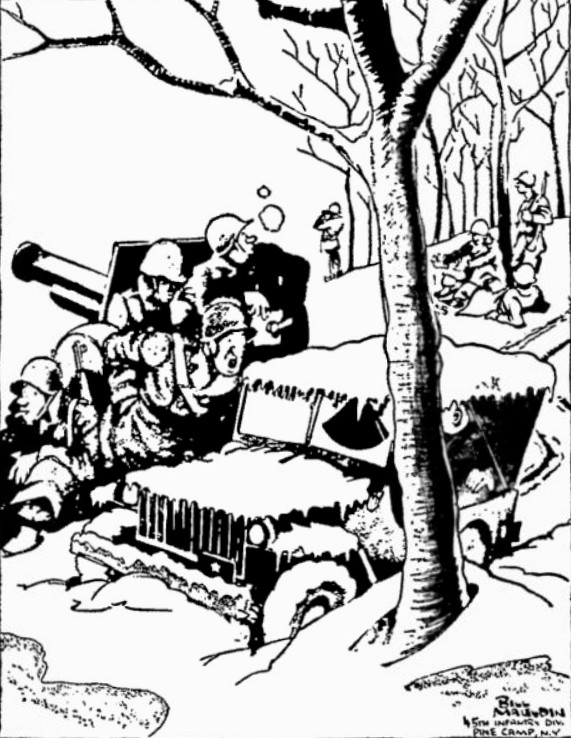The Pittsburgh Press (January 14, 1944)

Roving Reporter
By Ernie Pyle
In Italy – (by wireless)
The Stars and Stripes in the last war had many men on its staff who later broke into great prominence in the literary and magazine world. It is too early yet to tell what the various Army newspapers throughout the world in this war will produce, but we have a couple of likely candidates over here.
Soldiers and correspondents both would cast a willing vote for them right now. One is a reporter, the other a cartoonist. The reporter is Sgt. Jack Foisie of Berkeley, California; the cartoonist is Sgt. Bill Mauldin of Phoenix, Arizona.
Both are very young, both are quiet and earnest, both have native talent, and both have that ephemeral and uncultivated ability to express the soldiers’ viewpoint.
Sgt. Foisie has been on the staff of Stars and Stripes only since the invasion of Italy last July, yet he is already the man for whom the paper gets the most requests from units that want somebody to write about them.
Foisie has been overseas almost 15 months. Before transferring to the Stars and Stripes, he was in a tank-destroyer unit. He drove a half-track and ran a .50-caliber machine gun.
He fought all through Tunisia. He was never wounded, but in the Battle of Sidi Bouzid last February, he lost his half-track by a hit from an 88mm cannon. Along with it he lost everything he had, including his portable typewriter.
Before the war, Foisie was a reporter on The San Francisco Chronicle. When he went into the Army, he was determined not to lose the writing touch, so he brought his typewriter with him and wrote scads of letters to the folks back home, just to keep his hand in.
Doesn’t need practice now
He says his folks can’t understand how he could write them so often when he was in combat and is so bad about writing now that he has a quieter job. The answer is, of course, that he doesn’t have to write letters for practice anymore.
Toward the end of the Tunisian campaign, Jack wrote to Stars and Stripes and asked if there were any chance of getting on the staff. Capt. Boo Neville, the editor, wrote back a two-word letter:
Why not?
Jack thought he was being facetious and supposed that was the end of it. But 10 days later, here came official transfer papers with travel orders calling for transportation by airplane.
This airplane business so astounded and impressed Jack’s company commander that he cleaned up, put on his dress blouse for the first time in Africa, and personally drove Jack the 50 miles to the nearest airdrome to see him off.
Among correspondents Foisie has a reputation of always being willing to go anywhere and do anything. But he is shy, and for months kept in the background, just filling his job and saying nothing. Now that he knows everybody he jokes and kids as much as the rest.
When I first knew him, last summer in Sicily, he had a fairly marked hesitation in his speech. But on rejoining him in Italy, I noticed that it was gone. I spoke to him about it and he said he thought it was because he had gained more confidence in himself.
Although he is a good soldier, Foisie went up and down in rank six or eight times before joining Stars and Stripes, due largely to the whims of various commanders.
Loses regard for rank
His ups and downs destroyed all his regard for rank and now he truly doesn’t care whether he’s private, sergeant or lieutenant. He actually argued against it when they made him a sergeant on Stars and Stripes, and wouldn’t wear his chevrons until forced to.
Jack Foisie is 24. He is a darkish blond, with hair starting to thin in spots. He has a big chin, and his eyes are set back in his head, giving him the appearance of looking out of two narrow slits. He is left-handed, does not smoke, and is of French extraction but speaks little French.
He was born and raised in Seattle and went to the University of Washington for two years – until his folks moved to Berkeley. His father is Frank P. Foisie, head of the waterfront employers of the Pacific Coast, which means he’s the man who sits across the table and argues with Harry Bridges.
After the war, Jack has two ambitions – to finish school and to get married. The marriage business comes first. Her name is Florence McTighe and she lives in Trenton, New Jersey. The big question will be how to make a Californian out of her.
Foisie has lived a rugged life both as a combat soldier and as a reporter. Recently he has been on special assessment, living in town and making trips out to the airfield by jeep. He has found it interesting but is beginning to be a little frightened.
He said:
I’m getting soft. The life is too nice. It would be better to be back at the front living with doughboys and writing about them.
Tomorrow we’ll tell about Bill Mauldin, the cartoonist.



